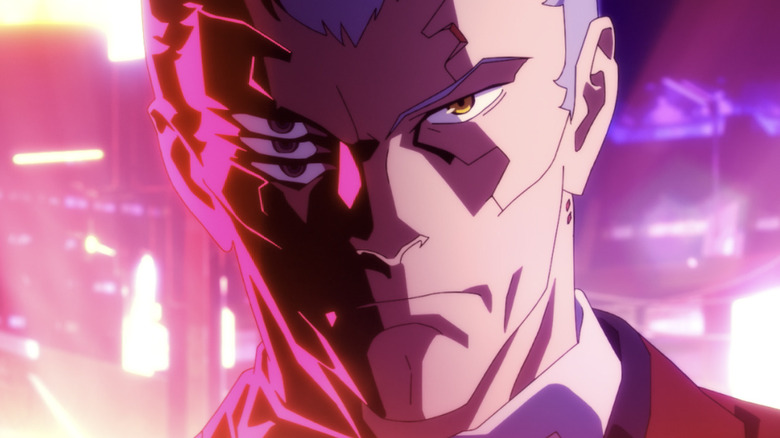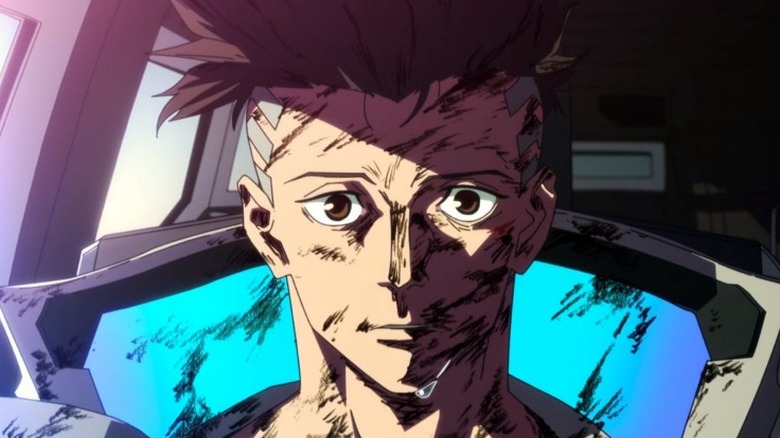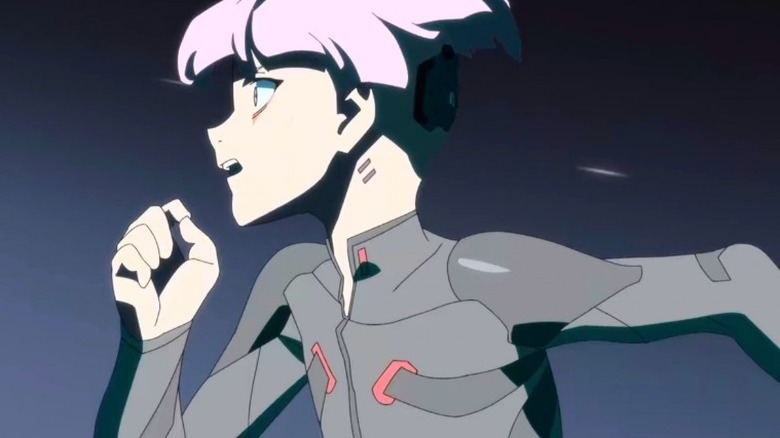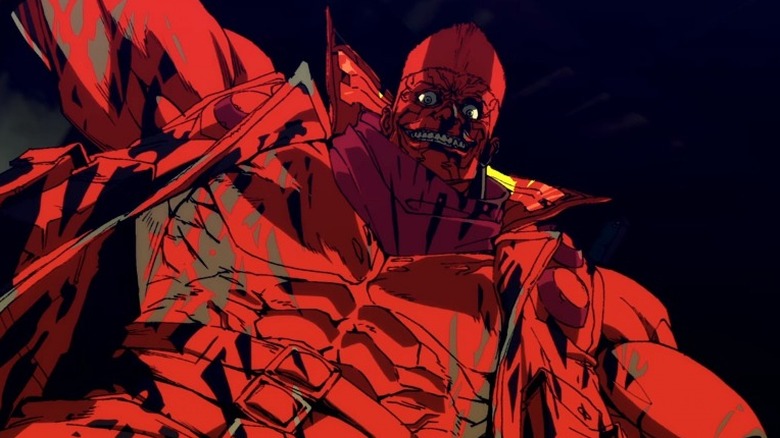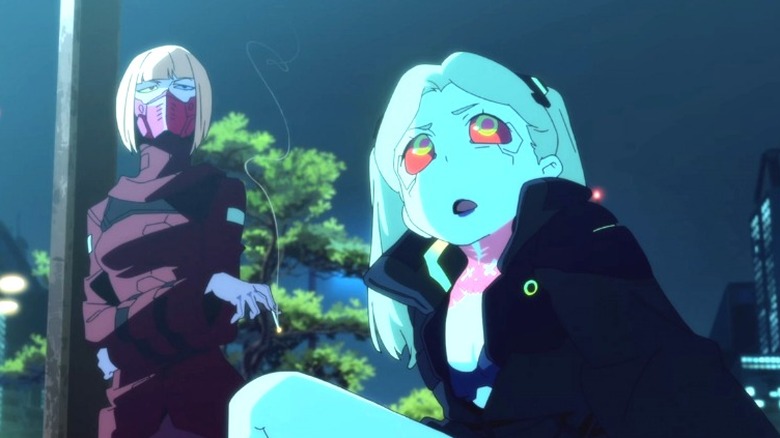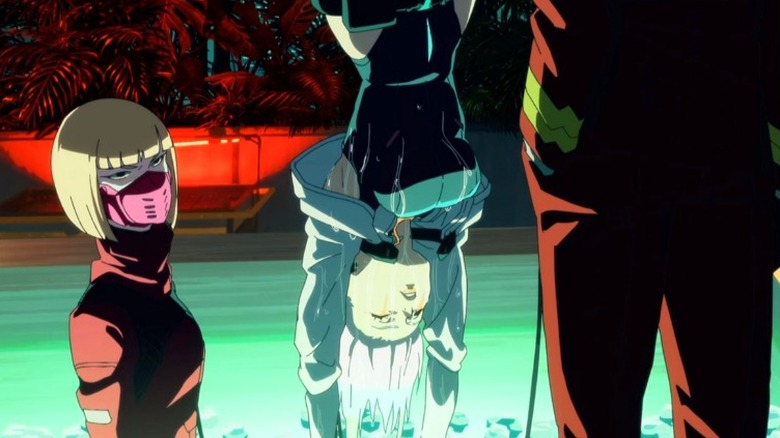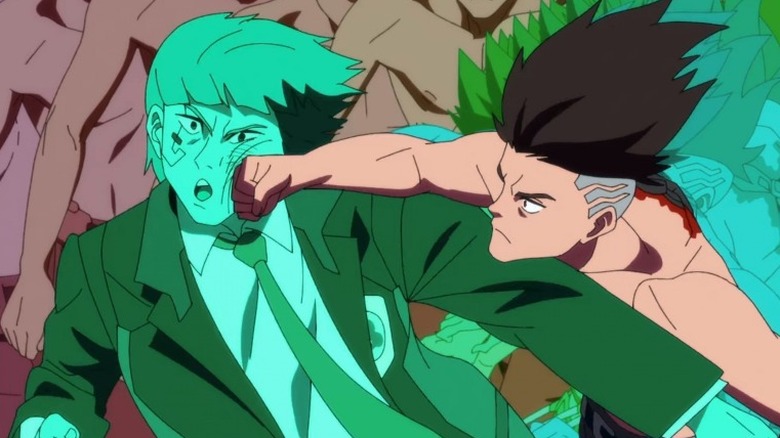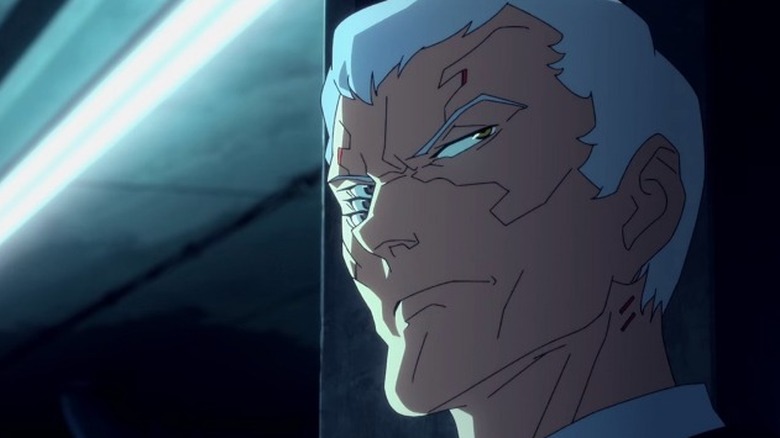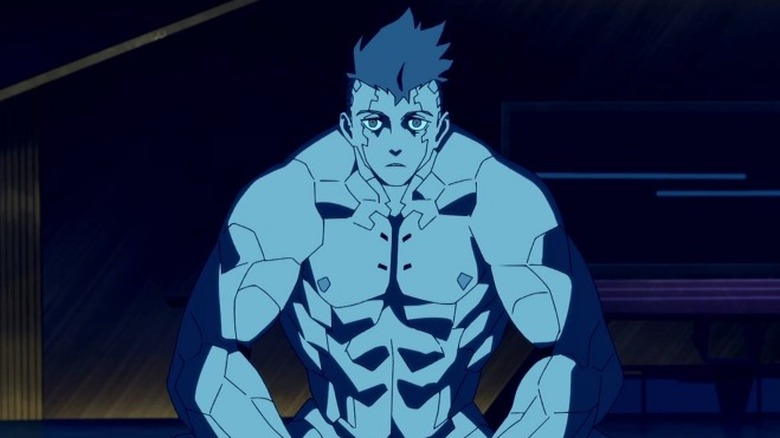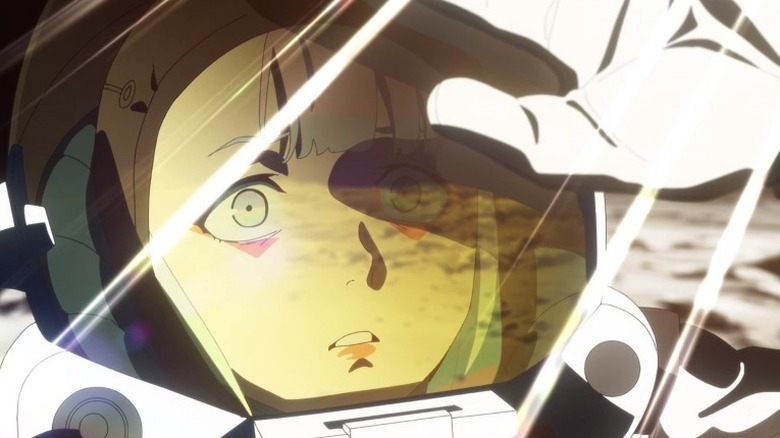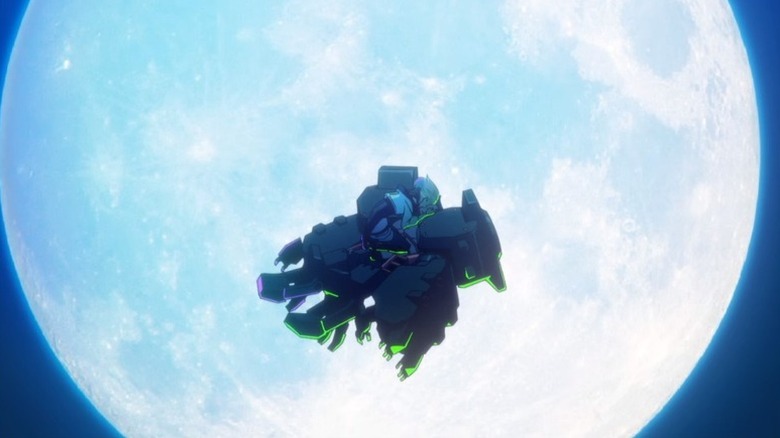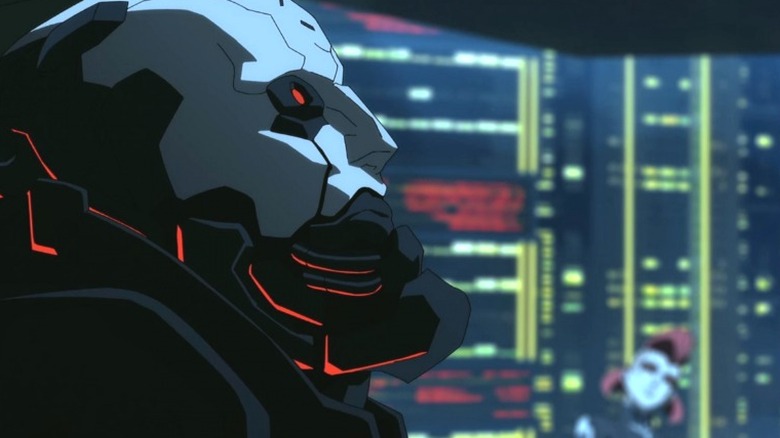The Ending Of Cyberpunk: Edgerunners Explained
Fans received the announcement of an adaptation of the game "Cyberpunk 2077" with cautious optimism. The 10-episode mini-series was animated by Studio Trigger, a production company responsible for excellent anime series like "Kill la Kill," but also baffling disappointments like "Darling in the Franxx." Ironically, the fact that CD Projekt Red, the developer behind the original game, was producing the series wasn't necessarily a source of comfort. After all, the title became famous for the numerous issues players experienced during its release. As a result, audiences didn't know if "Cyberpunk: Edgerunners" would be Netflix's next "Arcane" or "Resident Evil."
The final result was, to an extent, an unexpected hit. Hideo Kojima, director of the "Metal Gear: Solid" franchise, and "Danganronpa" creator Kazutaka Kodaka both praised the series (via Anime News Network). "Cyberpunk: Edgerunners" was also acclaimed by both critics and fans, achieving a 100% average score on Rotten Tomatoes (albeit with only 12 reviews), surpassing the 94% obtained by "Castlevania." It was even given credit for increasing the number of players of the original game, making it one of the top titles on Steam.
"Cyberpunk: Edgerunners" is set in the same world as "Cyberpunk 2077" but follows an original and powerful story. Its portrayal of unique but relatable characters struggling with poverty, trauma, and body image issues in the brutal streets of Night City keeps viewers emotionally captivated. It also provides commentary on the desensitization towards human suffering brought by inequality and corporate greed. In other words, it's an excellent example of the cyberpunk genre and, as such, deserves an in-depth analysis of its character arcs and themes. Here's the ending of "Cyberpunk: Edgerunners" explained.
Spoilers follow for "Cyberpunk: Edgerunners."
David's grief pushes him down a path of self-destruction
In the world of "Cyberpunk: Edgerunners" cybernetic enhancements are part of everyday life. People use them to become stronger, faster, and in the case of mercenaries, deadlier. Having said that, if those modifications are used to an extreme, both the body and mind of an edgerunner suffers. As Kurosaki says, they end up either dead or entering a violent psychotic episode from which there's no escape.
In the beginning, David seems relatively safe from this fate, as his interest in body modifications is limited. Yet the emotional distress experienced after losing his mother and being physically assaulted by a student from his school motivates him to install the Sandevistan on himself. David doesn't just use his newly acquired superhuman speed to get revenge; he also steals chips and, eventually, joins a gang of mercenaries led by the heavily modified Maine. Predictably, after several missions, David's mentor starts having hallucinations due to his excessive use of cybernetic enhancements. Instead of slowing down, though, he enters a state of denial, which only leads to worsening symptoms and his eventual demise during a violent psychotic episode.
Despite witnessing the terrible consequences of overusing cybernetic enhancements firsthand, the next time we see David he has drastically modified his body. He has transformed himself into an imposing cyborg who is already showing early signs of malfunction, including tremors and blackouts. It's possible that rather than understanding the lesson exemplified by Maine's demise, David increased the number of upgrades as a bad coping mechanism for depression. In other words, instead of accepting the guilt from not being able to protect his mother or his father figure, he ignores the warnings and puts himself at risk as a way to punish himself.
Lucy fights her childhood trauma with the help of David
At first, Lucy seems to be a well-adjusted individual, at least by Night City standards. She smoothly moves around crowds and steals their chips without being noticed. She also manages to keep her emotions at bay under dangerous circumstances; for instance, she maintains her cool when a nurse pulls a gun on her while treating David. In addition, after only one day of working with David, Lucy seems to have a very good idea about the type of person he is and shares her dream of going to the moon with him. However, later on, she reveals that she had a traumatic childhood.
Lucy explains that she was part of a group of children that were tested and trained at the Arasaka Corporation's facilities to become professional netrunners. When their training ended, though, the children were forced to dive into the virus-infested old web in search of lost data. This proves to be a dangerous task, taking the lives of the children one by one until what remains of the group decide to escape. Their attempt is answered with gunfire, leaving Lucy as the only survivor.
As a result of this experience, Lucy develops an aversion to deep dives. Unfortunately, the team is forced to ask her to perform this task once more when the team's netrunner is taken down while diving into one of their most important targets. Lucy immediately refuses and runs outside with David. There, a visibly scared Lucy asks David to give her words of encouragement so that she can undertake the task. He does and Lucy carries out the deep dive. While she momentarily relives a memory from her childhood, she manages to get over it, showing the positive impact her connection with David has had on her.
Maine's pride costs him his life
The most physically imposing member of the team, Maine is also the leader. His powerful enhanced limbs can knock down huge opponents and hide a set of cannons capable of shooting explosive projectiles. But Maine is more than a menacing-looking individual. He may demand a lot from his team, but he also does everything he can to protect them and gives them a fair share of the reward after every mission. In addition to this, Maine is more than happy to become a sort of father figure to David, providing him with advice regarding training, upgrades, and relationships. But as is the case with many leaders, the most fragile aspect of Maine's personality is his pride.
After going on a few missions with David where he demonstrates his ability to use his enhancements, Maine starts showing early symptoms of cyberpsychosis. First he starts having problems with his arm-mounted weapons, which begin to jam. Then it becomes evident to Dorio, Maine's second-in-command, that he's having blackouts, during which he finds himself trapped in a hallucinatory state. When Dorio and David confront Maine, he responds aggressively to any suggestion that he's losing control and quietly tells himself there's no way he's reducing his enhancements. Unable to distinguish between dream and reality and too prideful to seek help, Maine ends up accidentally killing Dorio during a fight with the police. This realization triggers a state of cyberpsychosis where he kills a team of officers and paramedics. He then proceeds to build a pile of explosives, which in his mind resembles a funeral pyre for Dorio, detonating it before completely losing control.
If you or anyone you know is having suicidal thoughts, please call the National Suicide Prevention Lifeline by dialing 988 or by calling 1-800-273-TALK (8255).
Rebecca refuses to change just to get someone's attention
Rebecca is the weapon specialist in Maine's gang. She has a positive attitude but also a very short temper which puts her at odds with her brother and gets her into some dangerous situations. Early on she develops an interest in David, offering him a drink and asking him to spend some time together. However, it becomes obvious that David feels no attraction toward her.
After a cyberpsycho kills her brother Pilar, Rebecca disappears from the team for some time. She returns soon after Maine's death, this time with her brother's taste for arm modifications, and shows a pair of massive mechanical hands she uses with precision. Rebecca still finds David attractive and very overtly tries to get his attention, asking him to dance and even calling him out for playing "hard to get," even though she knows that he is in a relationship with Lucy.
Tired of seeing her fail, Kiwi reminds her that she could change her appearance and personality, with Rebecca considering becoming more "shy and nerdy." This seems entirely possible, as David himself has changed from thin and agile to a bulky and powerful build, but in the end, Rebecca doesn't follow Kiwi's advice. She remains the same, probably understanding that it's not worth changing who you are in order to get the attention she wants. She also seems to accept David's rejection, although she remains a valuable and loyal part of the team until the very end.
Greed isn't the only reason Kiwi ends up trusting the wrong people
Kiwi is the netrunner of the team. She has a distant personality, yet she provides some important advice to her teammates — specifically, that they shouldn't trust anyone. However, when Faraday realizes that Lucy is the one attacking everyone trying to recover Tanaka's files, he sets a trap to capture her. Kiwi leads her team's attack on a convoy in an attempt by Faraday and Arasaka to make David find and test the cyber-skeleton. Unsurprisingly, though, Kiwi herself ends up betrayed by Faraday, who's charged with eliminating anyone who knows about Arasaka's powerful new battle suit.
Ironically, Kiwi doesn't follow her own suggestion of maintaining a mistrustful attitude. In fact, when she discovers Faraday's plan, she chooses to trust a man who is willing to betray anyone, even a powerful corporation like Militech. It's likely that promises of significant pay and becoming a valuable asset for Arasaka might have influenced her decision. But it's also important to consider that her loyalty to the team could have revolved around Maine, whose demise, as some Reddit users have suggested, she might blame on Lucy.
Inequality and lack of opportunities foster violence
From the first episode, it becomes clear that there's a divide between the citizens of Night City. On one hand, the higher classes have access to excellent educational institutions, health services, and cybernetics. On the other hand, the underprivileged citizens are at the mercy of evictions, medical problems, and crime. This divide, which is not uncommon within the cyberpunk genre, serves as a catalyst for the characters' motivations. David and his friends want to be able to afford a better life, while people like Faraday want to gain power and status.
The basic concept presented by "Cyberpunk: Edgerunners" — that inequality leads to a violent society — is supported by a study spanning 169 countries published in Social Science & Medicine. However, "Edgerunners" suggests that this happens not just because satisfying basic essential needs is more important than respecting the law. It's also because citizens from the lower classes are aware of the luxurious lifestyles and exciting experiences that exist in this world, even while their financial and social situation puts it all out of reach. David, for example, is a brilliant student at a prestigious academy, but due to his low income, he's considered an outsider. Lucy dreams of visiting the moon, but she lacks the funds necessary to buy a ticket. In her case though, the existential crisis is almost unavoidable as everyday rocket launches to the moon can be seen from almost everywhere in the city. With no legal ways to achieve their dreams and a certain level of disregard for others, it is not surprising that becoming a violent mercenary is such a popular job among the lower classes of Night City.
An unscrupulous search for profit leads to desensitization
In the world of "Cyberpunk: Edgerunners," fixers are the middlemen between corporations in need of information and gangs willing to break the law for the right price. In the case of Maine's gang, that fixer is Faraday, an unscrupulous individual who isn't afraid of betraying and killing people in order to fulfill the requests of corporations like Militech and Arasaka. Ironically, the corporations Faraday works for see him and Maine's gang as equally expendable. Arasaka, for example, doesn't offer him any form of protection when he arrives to deliver Lucy to them. In fact, they are only focused on protecting their company's interests, using a powerful enhanced mercenary in an attempt to stop David and keep their prototype a secret. Predictably, the fight that breaks out during the negotiation between Arasaka representatives and Faraday ends up killing him in a gruesome manner.
In a way, Faraday's lack of sympathy towards anyone who gets in his way while trying to gain money and power is a reflection of how corporations work in the world of "Cyberpunk 2077" and the cyberpunk genre in general. Sadly, it also reflects the practices of many companies in the real world, for whom the search for maximum profits can lead to ignoring the human rights of their employees or customers. For example, according to the New York Times, UPS's reluctance to install cooling systems could have put some of their drivers working during heat waves at risk. In addition, Nestlé has been accused of promoting the idea that formula is as healthy for babies as breast milk, which allegedly led to long-lasting health issues in various third-world countries (via The Guardian).
David's passion for cybernetics might be hiding a neurological issue
In "Cyberpunk: Edgerunners," upgrades are a normal occurrence. People use them for everything, from basic activities like studying and communicating with others to stealing chips and hiding powerful weapons. The level of modifications adopted is as high as a particular individual's ambitions. Having said that, the physical and mental strain they impose on their users sets a clear limit for most people. Interestingly enough, though, this doesn't seem to be an issue for David.
Initially, David is not particularly attracted to cybernetic modifications. But when he tries the Sandevistan, instead of being psychologically or physically overwhelmed, it feels right — even better than his normal body. He does suffer from side effects if he uses these enhancements repeatedly, but the fact that he can keep adding modifications with almost no consequences leads him to drastically alter his body. Interestingly, while the series implies that David's unique physiology allows him to modify his body to an extreme, this lifestyle could also be a sign that David suffers from a rare condition.
People with body integrity dysphoria have a neurological issue that allows them to be physically aware of a specific limb without recognizing it as part of their body. As a result, they want this part to be removed, even if there's nothing wrong with it. David seems to suffer from a fictional variation of this disorder, which makes him feel more complete after replacing organic parts with cybernetic implants. As in the real world, the desire to remove body parts can be so powerful that it can end in dangerous self-harming behaviors. It's possible that David's frustration with his own body could be a contributing factor to his risk-seeking and self-destructive attitudes.
If you or someone you know needs help with mental health, please contact the Crisis Text Line by texting HOME to 741741, call the National Alliance on Mental Illness helpline at 1-800-950-NAMI (6264), or visit the National Institute of Mental Health website.
Even a short life is worth living
Body and brain enhancements are a common thing in Night City, but only a few citizens venture into extreme modifications. For those without a career path or the right connections, modifying their body to acquire new and valuable abilities can be their only option for improving their income. However, these changes come with a price and — as many of the characters make clear, either by saying it or serving as a tragic example — edgerunners either end up dead due to their high-risk occupations or become violently psychotic. Nevertheless, most people are smart enough to limit the number of modifications they implement and use their abilities sparingly.
This is not the case for Maine or David, despite knowing very well the likely consequences of their excessive use of cybernetic enhancements. As a result, they have to come up with a way to cope with their shortened life span, which they do with different levels of success. Maine, for example, enters a state of denial when he's confronted with his worsening psychotic symptoms, rejecting the possibility of slowing down in order to recover. David, on the other hand, seems to realize too late that he has gone past the point of no return. But instead of panicking, he tries to make the best of his last moments in this world. As such, when being killed or becoming a cyberpsycho become the likely outcomes of David's last mission, he seems to be content with using his last moments to protect his team and find comfort in the fact that he's making sure that Lucy's dream comes true.
Guilt can force people to live their lives for others
David is constantly referred to by Lucy as someone following other people's dreams. This appears to be true, as he doesn't seem to have any specific life objectives. Instead, David has a broad desire to achieve fame and money, which is consistent with his mother's dream to see him succeed. However, David's quest for success, at least as an edgerunner, could also be motivated by guilt. After all, his last interaction with his mother ends up making her cry after she realizes that working extra hours for years to pay for David's expensive school actually meant close to nothing for him.
David's mother is not the only character whose dreams he is ostensibly trying to realize. Maine's desire to become a powerful leader is interrupted by his unexpected death, so David takes over and even adopts an appearance that resembles the powerful body of his former mentor.
Interestingly, it's affection instead of guilt that motivates David to save Lucy during his last mission. It is possible that his desperate attempts to rescue and protect her go beyond his desire to be with her, as he knows it's very likely he won't survive. Instead, it might be an attempt at redeeming himself. At the end of the day, even though he wasn't able to save his mother or Maine, he does everything in his power to, at the very least, save Lucy.
Smasher represents the best possible scenario for an edgerunner
The world of "Cyberpunk: Edgerunners" has a bleak tone. The inhabitants of Night City's poor neighborhood seem to be desensitized to poverty and crime. Education doesn't seem to provide a way out of these conditions, as people who come from rich environments won't see them as one of their own, even if they somehow manage to attend an expensive school. The only alternative left is to become a valuable asset for corporations, who are always looking for paid mercenaries. And in order to do that, it's necessary to go through radical body modifications.
Of course, there is a price to pay for such enhancements; edgerunners experience debilitating side effects that affect both their bodies and minds. As a matter of fact, the series makes it clear that there's no way around it, and that even a legendary soldier like Adam Smasher couldn't escape this fate. Or, at least viewers are supposed to believe that until his appearance in the last episodes of the series where he emerges as the head of security of Arasaka. In order to escape the side effects of cybernetic implants, though, Smasher has to let go of most of his organic components and become an almost completely robotic entity. As such, with an extended lifetime and a guaranteed role in a powerful corporation, Adam Smasher represents the best possible scenario for an edgerunner living in Night City — to become a useful tool in the hands of those in power.
